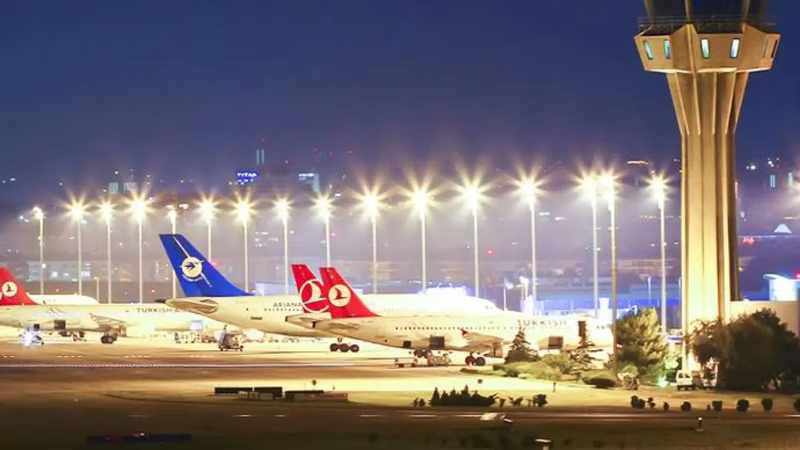
Turkey"s extensive transport network supports trade and connectivity. "
Turkey has an extensive road network that connects major cities and towns throughout the country. The road system includes both highways and local roads. The major highways are generally in good condition, and several ongoing projects aim to improve the road infrastructure further. Turkey has a railway network that spans across the country. The railway system is primarily focused on freight transport, but there are also passenger services available. The government has been investing in the development of high-speed rail lines, including the Ankara-Istanbul and Ankara-Konya routes.
In 2013, there were 98 airports in Turkey handling passengers, 22 of which were international airports. Ataturk International Airport is the 11th busiest airport in the world on a multi-year average. Many Turkish airports are in very good condition and the number of passengers is very high. The government is also working to make the most of the sector's economic potential and is planning to build more modern and larger airports. Istanbul's new airport was inaugurated with the plan to become the world's largest airport, and Turkish airlines have gained worldwide fame by beating out their regional rivals, such as Iran Air from Iran. Turkish Airlines currently has a fleet of 349 and can travel to 126 countries.
Apart from the issue of exports and imports, usually a series of goods subject to customs duties, along with travelers entering or leaving Turkey. The valuation of this product is usually the price standard equal to one thousand five hundred euros. For goods over one thousand and five hundred euros, usually a duty equal to ten percent with the calculation and deduction of the exemption of three hundred euros, and for goods below one thousand five hundred euros, duties equal to ten percent but without the calculation of the exemption of three hundred euros. These goods will be subject to such duties following the following conditions.
- Goods that are shipped to give as a gift to someone.
- Goods that are shipped with one person or goods that are sent by mail.
- Goods that come and go for family or completely personal travelers.
- Non-commercial goods and goods that a person does not need to pay to buy.
Customs rules for the entry and exit of currency from Turkey
- For exporting foreign currency from Turkey, it is necessary that this process be legally registered.
- For jewelry, precious jewelry and gemstones worth 1,500 euros or less can be exported from Turkey, but for jewelry worth more than 1,500 euros, legal registration is required. Of course, this is in a situation where there is no business purpose.
- Withdrawing more than $ 5,000 in Turkish currency will be limited.
- Foreign currencies can eventually be exported up to $ 5,000, and only individuals over $ 5,000 can be removed from Turkey to prove that they have received the currency from a reputable bank.
Turkey has several international airports, with Istanbul Atatürk Airport and Istanbul Sabiha Gökçen Airport being the busiest. Istanbul's new airport, Istanbul Airport, became fully operational in 2019 and is one of the largest airports in the world. Numerous other airports serve domestic and international flights across the country. Major cities in Turkey have well-developed public transportation systems, including buses, trams, metro lines, and ferries. Istanbul, Ankara, and Izmir have more extensive networks, while other cities have smaller-scale public transportation systems.
Turkey has a significant coastline along the Mediterranean, Aegean, and Black Seas, making maritime transport an important mode of transportation. There are numerous ports and marinas across the country that handle both domestic and international shipping. Turkey is known for its impressive bridge and tunnel projects. Notable examples include the Bosphorus Bridge and the Eurasia Tunnel in Istanbul, as well as the Osman Gazi Bridge and the Yavuz Sultan Selim Bridge, which connect different parts of the country.
-
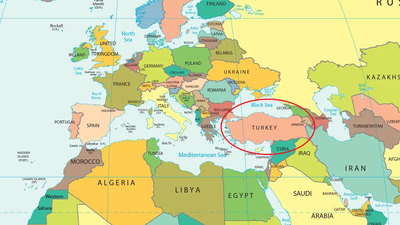
Turkey"s strategic geographical location at the crossroads of Europe and Asia enhances its role in international trade, particularly in the Middle East. Bordered by several countries and seas, Turkey serves as a vital transit point for goods and energy. The Turkish economy is diverse, with significant contributions from agriculture, manufacturing, and services. It ranks 13th globally in purchasing power parity and has a rapidly growing private sector that plays a crucial role in banking, transport, and communications. The automotive industry is notable, with Turkey being the 14th largest automaker worldwide. Additionally, Turkish brands are prominent in consumer electronics across Europe. The country has successfully modernized its industries to cater to both European and Middle Eastern markets, leading to substantial imports from nations like Iran and Iraq. This dynamic economic landscape positions Turkey as a key player in regional trade networks. "
-
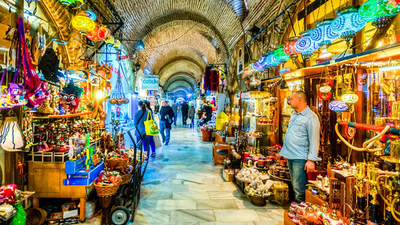
Travelers leaving Turkey must ensure their passport is valid for at least six months beyond their departure date to avoid complications. It"s crucial to check the validity of any visa or residence permit, as overstaying can lead to fines or restrictions. Understanding customs regulations is essential, particularly regarding the export of goods, artifacts, and souvenirs. The value of gifts and souvenirs should not exceed five thousand liras; otherwise, they are subject to special export rules. For those leaving permanently, notifying authorities about the cancellation of residence permits is necessary. Settling all financial obligations before departure is also important. Travelers should carry official invoices for purchased goods to facilitate customs checks and avoid issues with customs officials. Additionally, awareness of duty-free allowances in the destination country is vital, as exceeding these limits may require declarations and payment of duties.
Prohibited items such as illegal drugs and weapons must not be carried when leaving Turkey. Lastly, understanding the specific regulations related to the mode of transportation used for departure—whether by air, sea, or land—is essential for a smooth exit. "
-

Turkey"s transport infrastructure is extensive and continually improving, featuring a well-maintained road network that connects major cities. The railway system primarily focuses on freight but also offers passenger services, with significant investments in high-speed rail lines. Turkey boasts 98 airports, including 22 international ones, with Istanbul"s new airport aiming to be the world"s largest. Turkish Airlines has expanded its global reach significantly. Customs regulations for imports and exports are in place, particularly concerning goods valued over €1,500 and currency export limits. The country also has a robust public transportation system in major cities and a significant maritime transport network supported by numerous ports. Notable infrastructure projects include iconic bridges and tunnels that enhance connectivity across the region. "
-
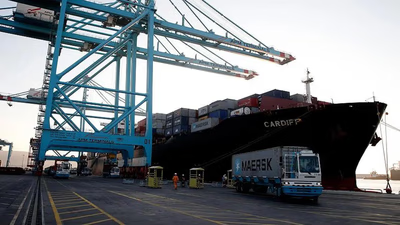
Turkey is a significant player in global exports, particularly in the automotive, textile, and agricultural sectors. The country ranks among the largest automotive producers in Europe, with major brands like Ford and Renault establishing manufacturing facilities. The textile industry is another cornerstone of Turkey"s export economy, known for its quality and diversity, making it a key supplier to Europe. Agricultural exports are robust, including fresh produce and processed goods, contributing to Turkey"s status as a leading exporter in the EU. In 2018, Turkey"s exports reached $156 billion, marking a 10. 22% increase from the previous year. The jewelry sector also thrives, recognized for its craftsmanship and unique designs. Home appliances have seen significant growth as well, with brands like Beko gaining traction in European markets.
Additionally, Turkey"s machinery and steel industries contribute to its diverse export portfolio. Overall, Turkey"s strategic investments across various sectors have enabled it to diversify its export offerings effectively. "
-
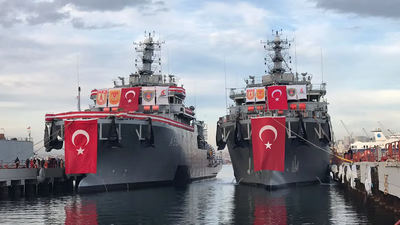
Turkey"s export landscape is dominated by key markets such as Germany, the UK, and Iraq. Germany stands out as the largest importer, with Turkish exports reaching over $18 billion annually, driven by a significant Turkish population contributing to economic ties. The UK follows closely, with exports including automobiles and textiles projected to hit $11 billion. The United Arab Emirates has seen a remarkable increase in imports from Turkey, surpassing $11 billion this year. Iraq remains a crucial neighbor for Turkish exports, particularly in construction materials and textiles, with figures exceeding $10 billion. The United States also plays a vital role in Turkey"s export economy, importing machinery and textiles worth around $10 billion. Other notable markets include Italy and France, each importing over $10 billion in various products like automotive parts and chemicals. This diverse export portfolio highlights Turkey"s strategic position in global trade networks across Europe and the Middle East. "





